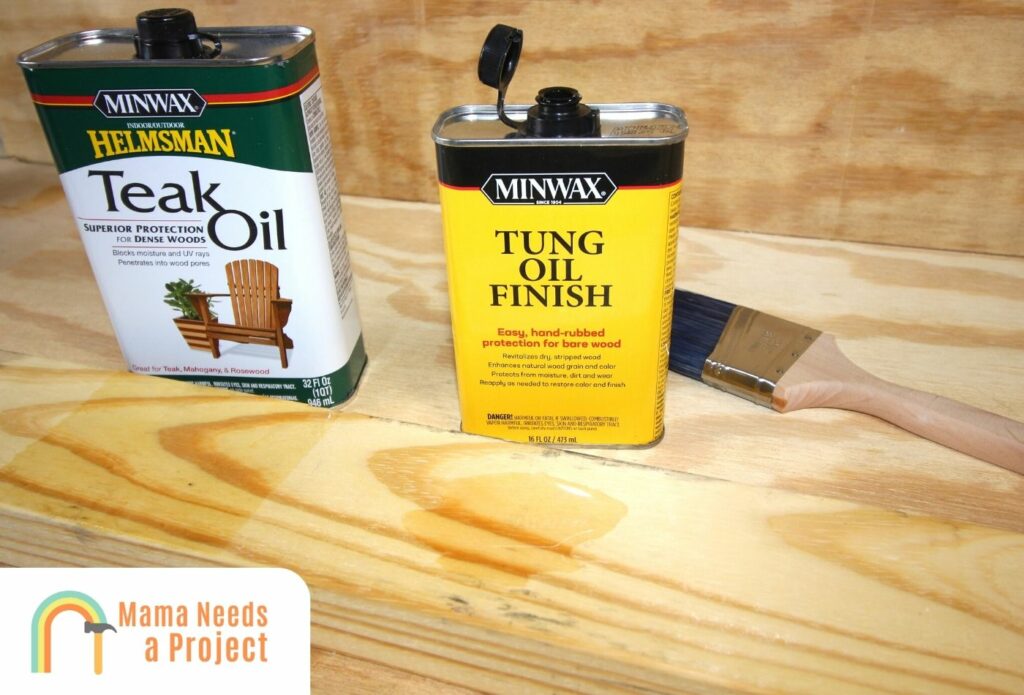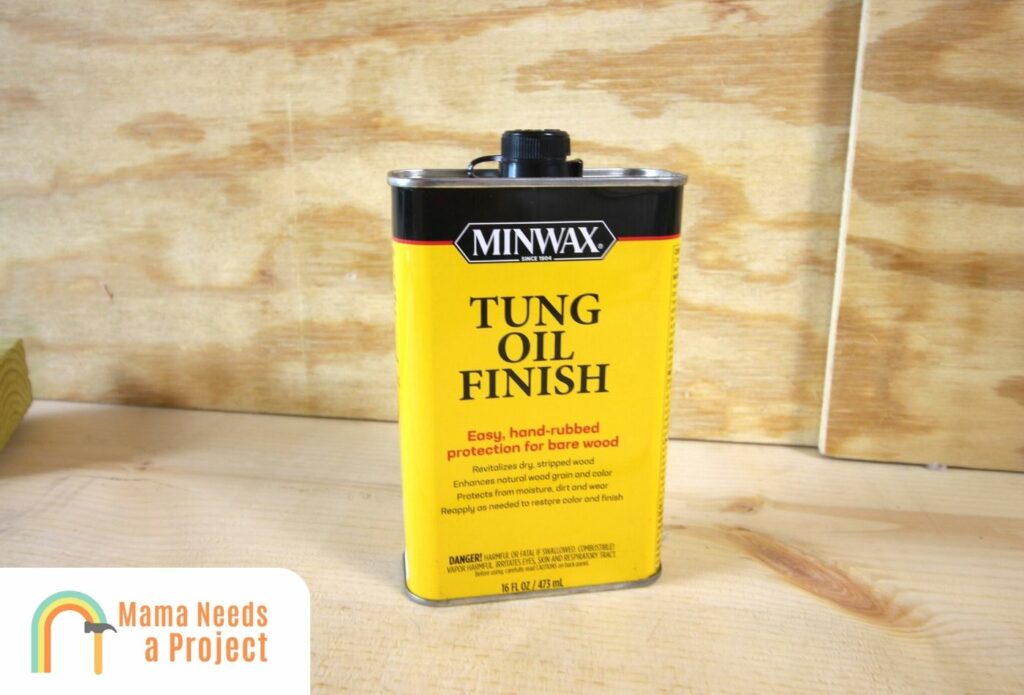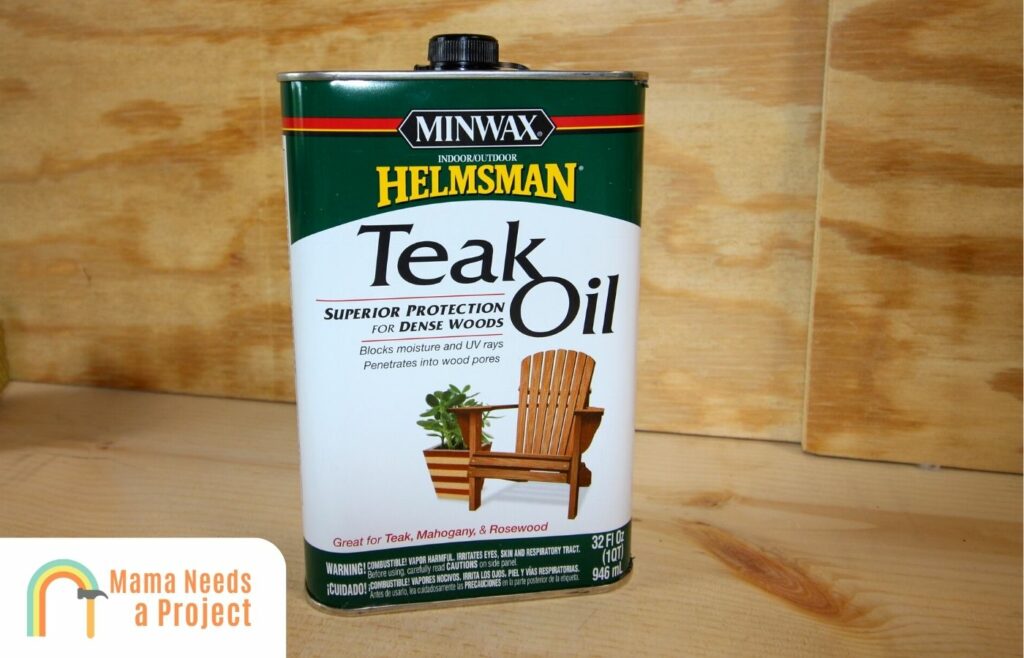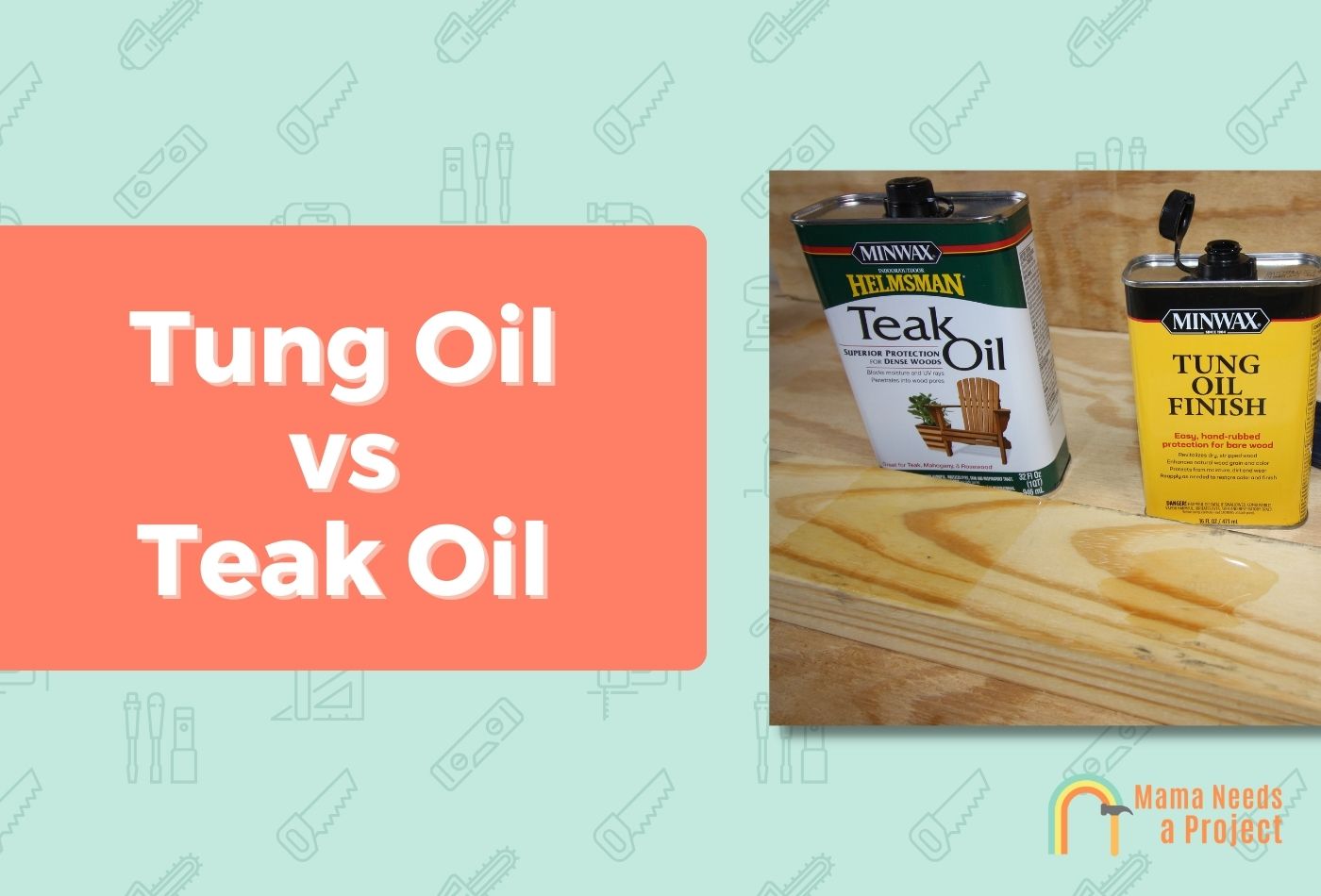Tung Oil vs Teak Oil: Which is Better? (Ultimate Guide)
When it comes to finishing oils, there’s a handful of choices for your wood projects.
Two of the most popular include tung oil and teak oil. While they are pretty similar, they have some key differences you should be aware of.
In this tung oil vs teak oil comparison, I’ll help you decide which oil you should use. Let’s get started!
- Tung oil is better for projects that need maximum water protection. The oil seeps into the wood pores to seal out water which makes it amazing for outdoor furniture. Additionally, tung oil is non toxic and food safe, making it great for wood surfaces in your kitchen.
- Teak oil is better for projects that require more protection against everyday wear and tear. Because teak oil is made of several different oils and solvents – it can be more durable than tung oil.
Differences Between Tung Oil and Teak Oil

Protection Level
In terms of protection, both tung oil and teak oil do a great job of adding a protective layer to your projects.
That said, teak oil gives you just a bit more protection because of how it’s made with several different oils and solvents.
Teak oil offers great UV protection and it’s more resilient to scratches because of how it sits on your wood and its components.
But don’t get me wrong, tung oil is a still a fantastic finish that can be a great way to protect your projects. Because of how well tung oil finishes seep into the pores of your wood, you’ll get more protection against moisture.
Check out my tung oil vs polyurethane comparison to find out which offers better protection for your projects!
Water Resistance
Which oil is more water resistant? This battle goes to tung oil.
Tung oil repels water with ease once it’s fully cured making it a perfect sealant for outdoor furniture.
Again, teak oil isn’t terrible at sealing out moisture, but tung oil does a slightly better job.
Drying Time
In terms of drying time, both tung oil and teak oil are on the faster side of things – but teak oil gets the edge here.
In most cases, tung oil dries in around 24 to 48 hours where teak oil dries in around 12 to 24 hours per coat.
Keep in mind that there are tons of considerations that can affect the drying time of your oil, so if you’re wanting to speed up the process – be sure to apply it in a dry area at regular temperatures.
Color & Appearance
When it comes to the color and appearance of your finish, it’s ultimately going to depend on what you’re looking for.
I’ve used both tung oil and teak oil on a handful of projects and they have all turned out amazing.
Teak oil is known to change the color of some woods because of how it sits on your wood and becomes discolored over time. It often gives off a warm and radiant glow – which you may or may not like.
Because tung oil will penetrate wood, it doesn’t tend to change color much.
So if you prefer the natural color of your wood – go with tung oil. But if you don’t mind a stronger protective coating that may slightly change the color of your wood – teak oil is a great choice.
Toxicity
If you’re looking for a less toxic oil, go with tung oil. Because pure tung oil is a natural oil, it’s completely non toxic and food safe (which makes it perfect for projects like cutting boards).
Teak oil can contain a mix of solvents that offer better protection for your projects, but it isn’t always food safe. You should check the label of your teak oil for more details on the toxicity.
Ease of Application
You can apply tung oil and teak oil pretty easily – so there isn’t much of a difference in this department.
The only real difference could be the fact that for better protection, you’ll need to apply several coats of tung oil whereas you can get away with one or two coats of teak oil.
Price
In terms of price, both finishing oils offer about the same value.
You should be bale to pick up both oils for under $20. That said, I recently purchase both oils and the tung oil was a few bucks cheaper than the teak oil.
Tung Oil Basics

Tung oil, which can sometimes be referred to as China wood oil, is made from tung tree nuts and has origins dating back as far as 400 BC. It’s a great oil for wood finishing and provides great water resistance for your projects.
Pros of Tung Oil
- Natural and Pure: Pure tung oil is derived from the seeds of the tung tree without additives.
- Deep Penetration: It provides in-depth protection by penetrating deep into the wood fibers.
- Water Resistance: Offers a notable level of water resistance, especially with multiple coats.
- Durable Finish: It provides a hard, durable finish resistant to wear and tear.
- Food-Safe: Pure tung oil is non-toxic and safe for surfaces in contact with food once cured.
Cons of Tung Oil
- Longer Drying Time: Tung oil typically takes longer to dry between coats compared to teak oil.
- Application: It can require more coats and more attention during application to ensure an even finish.
- Darkening Effect: Tung oil can darken some woods or give them a more amber hue, which might not always be desired.
- Odor: Freshly applied tung oil has a distinct smell which some might find unpleasant, though it dissipates as it cures.
When to Use Tung Oil
Tung oil is a great finish that can be used on a wide range of wood projects including wood furniture, cutting boards, and plenty of other interior projects that need added protection. If you’re looking for an oil that exposes your woods natural grain, tung oil is an amazing choice you won’t regret.
Teak Oil Basics

Teak oil is a unique finishing oil that’s often comprised of other oils and solvents such as linseed oil and sometimes including tung oil itself!
Teak oil is a great way to protect wood that takes a beating day in and day out because of its more durable composition.
Pros of Teak Oil
- UV Protection: Many teak oil products offer protection against harmful ultraviolet rays, making it suitable for outdoor furniture.
- Fast Drying: Generally, teak oil dries faster than tung oil.
- Ease of Application: It’s relatively easy to apply, especially on dense woods, and might require fewer coats.
- Enhanced Appearance: It can provide a slight gloss, enhancing the wood’s natural colors and giving a fresh, well-maintained appearance.
- Moisture Resistance: Teak oil is formulated to resist moisture, making it suitable for outdoor applications.
Cons of Teak Oil
- Not Always Pure: The term “teak oil” can be misleading, as it’s often a mixture of various oils and solvents. The exact composition can vary by brand.
- Potential Toxicity: Due to its varied formulation, it might contain chemicals not suitable for surfaces in contact with food.
- Lesser Longevity: Depending on the formulation and the environmental conditions, it might not last as long as tung oil before requiring a reapplication.
When to Use Teak Oil
Teak oil is another solid wood finish that’s fantastic for outdoor projects such as outdoor furniture, decking, and garden boxes. Because it’s made through a mix of oils and solvents – it does a great job of adding UV and water resistance to your projects. Teak oil gives off a more shiny color that’s more similar to polyurethane.
Tung Oil vs Teak Oil vs Danish Oil
While teak oil vs tung oil is an interesting comparison, don’t forget about danish oil. Danish oil is another common finishing oil that’s notably different.
Similar to teak oil, danish oil is comprised of several different oils including linseed oil, tung oil, and other varnishes or thinners.
Instead of giving a more glossy look to your wood, danish oil offers a more low-luster finish that highlights the woods natural grain.
Danish oils are most widely used for interior wood projects that require additional protection from regular surface scratches. I’ve found that it’s not great for exterior projects as you don’t get the same level of moisture resistance as you do with tung oil.
FAQs
What are the disadvantages of tung oil?
Some of the disadvantages of tung oil are that it can take longer to dry than other oils and you can get a discolored finish over time that you may not want.
What is the best oil to use on outdoor wood furniture?
The best oil to use on outdoor wood furniture will depend on how much protection you want, but I highly recommend either teak oil or tung oil. While tung oil offers greater water resistance, teak oil is slightly more durable.
Final Thoughts
So, which is better – teak oil vs tung oil?
Ultimately, it’s going to depend on the project, but I’m a big fan of teak oil for projects that need more protection and I use tung oil for outdoor projects that require more water resistance.
Either way, you can’t go wrong with either of these finishing oils for your wood projects.

